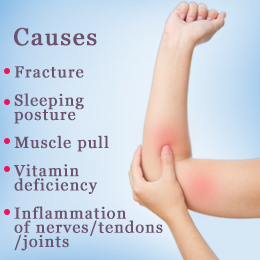Arm pain, in most cases, occurs due to injury. In some cases, however, certain underlying medical conditions could also be responsible for the same. Here we discuss right arm pain in women, and some self-care measures to manage the condition.

Arm pain in women usually occurs due to problem in bones, muscles, ligaments, and tendons. Excessive movement of hands is also responsible for pain in the muscles. A recent study has shown that pain in right arm is a rare symptom of heart attack (earlier left arm pain was considered to be a warning sign of heart attack).
Some Self-Care Measures
- Pain from muscle pull remain at the maximum for 3-4 days. You can apply a pain relief balm on the sore portion. Sprays are also quite effective in alleviating pain instantly.
- Prepare a concoction with chamomile oil and mustard oil. Warm the mixture and gently massage the affected area with this oil.
- Immerse your right arm in a container full of warm water. Sprinkle some sea salt in it and take a hot compress.
What Causes Pain in the Right Arm?
Sleeping Posture
If you are sleeping over your right arm, then it will pain after some time. This happens due to disturbance in blood circulation resulting from the pressure applied on the arm. The pain is sometimes accompanied by numbness.
Injury or Fracture of Arm
If your right hand is fractured you will experience severe pain. The pain tends to linger even if you've had a fracture months ago. Bone injuries are intensely painful and your right arm might swell as well. Such types of injuries more often result from accidents.
Muscle Pull
It often happens that there is a muscle tear without your realization, and you experience the pain later. A muscle pull can be painful if it gets overstretched all of a sudden. The most common reason behind this type of problem is doing rigorous exercises or a sudden lifting of heavy weights without a proper warm up. Activities involving lots of hand movements like swimming, tennis, badminton, cricket, baseball, etc., often cause muscle pain and twitching.
Inflammation of Nerves
Inflammation of nerves present at the junction of the neck and shoulder causes pain in the right arm. A pinched nerve affects the signal transduction pathway of the spinal cord. The pain is sharp and is accompanied by a ingling sensation. Numbness is felt when muscles of the shoulder lose control. This is one of the initial symptoms of carpal tunnel syndrome, which is also characterized by compaction of a median nerve in the wrist.
Inflammation of Tendons
Tendons are a branch of connective tissue present between bones and muscles. Inflammation of tendons present in the right hand causes pain in the affected area. Tendons get inflamed due to overexertion of hands. Bicipital tendinitis is a condition wherein the tendon present near the shoulder is torn or damaged. Tennis elbow is another condition that is quite often experienced by tennis players. Under such circumstances the tendons tend to fray due to continuous movement of arms.
Inflammation of Joints
Like tendons and nerves, inflammation of joints can also occur in women. Rheumatoid arthritis is one such condition wherein the joints get inflamed leading to restriction in movement of the right hand. The symptoms are redness around joints, swelling, tenderness, and excruciating pain in the affected hand.
Vitamin Deficiency
Women over 35 are vulnerable to developing multiple bone disorders due to deficiency of calcium, iron, and other minerals. In such cases, both the arms might pain. This happens because the bones either become weak or get inflamed. Arthritis or rheumatoid arthritis is the most common medical condition that could bring this condition on.
Doctors often suggest mild doses of painkillers to provide immediate relief to an aching arm. Muscle sprains are cured effectively through specific exercises performed by physiotherapists. Also make sure that you are not resting on your arm while sleeping. If the home remedies fail to reduce the pain, then go for a medical check up to get the right treatment.
Disclaimer:
The information provided in this article is solely for educating the reader. It is not intended to be a substitute for the advice of a medical expert.


 Arm pain in women usually occurs due to problem in bones, muscles, ligaments, and tendons. Excessive movement of hands is also responsible for pain in the muscles. A recent study has shown that pain in right arm is a rare symptom of heart attack (earlier left arm pain was considered to be a warning sign of heart attack).
Arm pain in women usually occurs due to problem in bones, muscles, ligaments, and tendons. Excessive movement of hands is also responsible for pain in the muscles. A recent study has shown that pain in right arm is a rare symptom of heart attack (earlier left arm pain was considered to be a warning sign of heart attack).